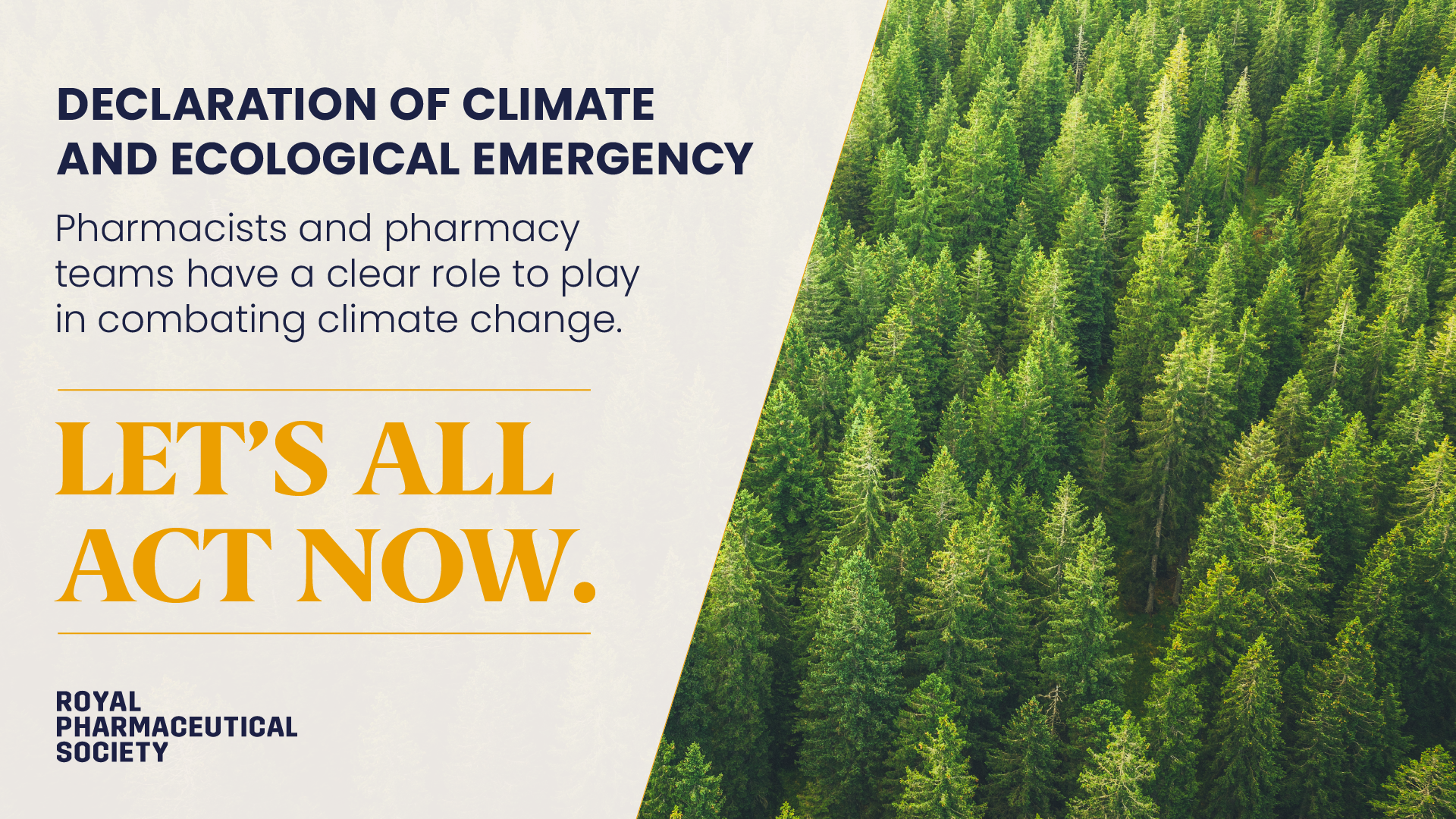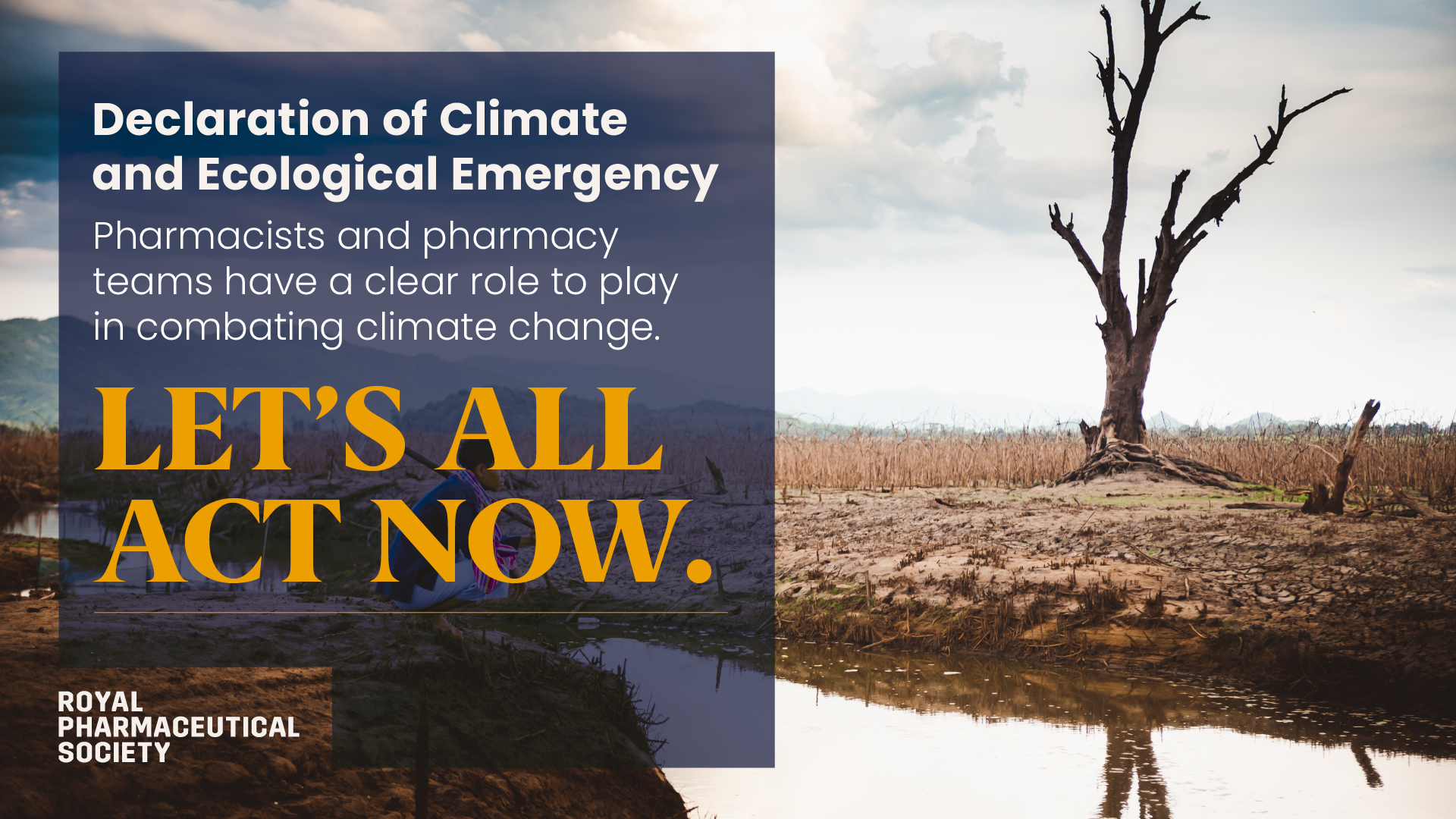Expanded Introduction
The Royal Pharmaceutical Society (RPS) is committed to taking action to tackle the climate and ecological emergency.
In September 2021, we formally recognised the scale and importance of the situation by publishing a climate declaration.1
In October, the Professional Bodies Climate Action Charter launched which the RPS became a signatory following unanimous support from National Country Boards. Developed by the Professional Associations Research Network, of which the society is a long-standing member, the charter is designed to guide effective and high-quality climate action by professional bodies.
This acknowledges that far from being simply an environmental issue, climate change is the most significant health threat that modern society has ever faced.3 It affects the social and environmental determinants of health – clean air, safe drinking water, sufficient food and secure shelter, ultimately leading to declines in human health especially across the most vulnerable and deprived in society further compounding health inequalities.4
Modelling shows us that the last 50 years of public health gains will be wiped out if we don’t do something now.

Context for Change
The United Nations chief described the latest Inter-Governmental report on Climate Change5 (IPCC) as a code red for humanity, saying that unless we act decisively now, we will exceed the 1.5 degrees of warming across the world.6 He said the message is clear that we must raise our level of ambition to mitigate certain climate disaster, there is no time for delay and no room for excuses.
Without action, climate change will define the health profile of current and future generations and will challenge already overwhelmed health systems.
Demand for healthcare is already increasing, with a growing and ageing demographic, increasing global burden of disease, and increasingly complex diagnostic and treatment methods. As the number of people with multiple health conditions grows, meeting their needs will be one of the biggest challenges facing the NHS.
Pharmacists are experts in medicines and their safe and effective use.7 This is particularly important as medicines are the most common intervention in healthcare.8
They
have three major impacts on the environment: the chemical effects of
the Active Pharmaceutical Ingredients (APIs) themselves, the large
carbon footprint involved in manufacture and distribution, and
pharmaceutical waste.
If we consider the life cycle of a medicine, from design and development, marketing authorisation to production, post- authorisation, health technology assessment, prescription and consumption and finally waste disposal, pharmacy can have an impact at every stage.
We know that medicines account for about 25% of carbon emissions within the NHS9, so pharmacists
have
a professional responsibility to ensure more sustainable use of
medicines and to decrease the carbon footprint and environmental risk
of all pharmaceutical care.
The role of the pharmacist and the pharmacy team in preventing illness, optimising medicines and reducing pharmaceutical waste already reduces the impact of medicines on the climate. What we haven’t done before is overtly link the two.
Pharmacists are trusted health professionals. As a profession we need to inform and educate patients and the public about the link between climate crisis and health, which we hope will motivate others to act, resulting in healthier living and reduced environmental impact.
There will be areas where pharmacists and pharmacy teams can act now to have quick impact through sometimes small changes in the way we work, through to larger full system changes in the way services are designed and delivered.
RPS are committed to supporting and advocating on behalf of the profession to make pharmacy’s voice heard and stimulate action in areas that require multi-agency or systemic change. We are calling for the pharmaceutical industry, governments across GB and other stakeholders to work with us to make the changes that are required to tackle the climate emergency.
Significant research and stakeholder engagement has been undertaken to identify key priorities for how pharmacy teams can respond to the climate and ecological emergency.
- Improving prescribing and medicines use
- Tackling medicines waste
- Preventing ill health
- Infrastructure and ways of working
About this policy
This policy was
developed with input from RPS members and multiple pharmacy
stakeholders across GB.
The content was guided and reviewed by an
Expert Advisor: Sharon Pfleger, Consultant in Pharmaceutical Public
Health, NHS Highland; Professor (Visiting), Robert Gordon University,
Aberdeen; Associate, The Environmental Research Institute, University
of the Highlands and Islands; and Co-Founder, One Health Breakthrough
Partnership.
This is a live document and will
be amended as evidence changes.

- https://www.rpharms.com/about-us/sustainability/declaration
- https://9tj4025ol53byww26jdkao0x-wpengine.netdna-ssl.com/wp-content/uploads/2021-07-01-Professionals_Charter_text.pdf
- https://www.england.nhs.uk/greenernhs/wp-content/uploads/sites/51/2020/10/delivering-a-net-zero-national-health-service.pdf
- https://www.who.int/news-room/fact-sheets/detail/climate-change-and-health
- https://www.ipcc.ch/report/ar6/wg1/
- https://www.ipcc.ch/assessment-report/ar6/
- https://pip.scot/2018/07/07/pharmacists-are-the-experts-in-medicines-says-alex-mackinnon/
- https://digital.nhs.uk/data-and-information/data-insights-and-statistics/prescribing-and-medicines-team
- https://www.england.nhs.uk/greenernhs/a-net-zero-nhs/areas-of-focus